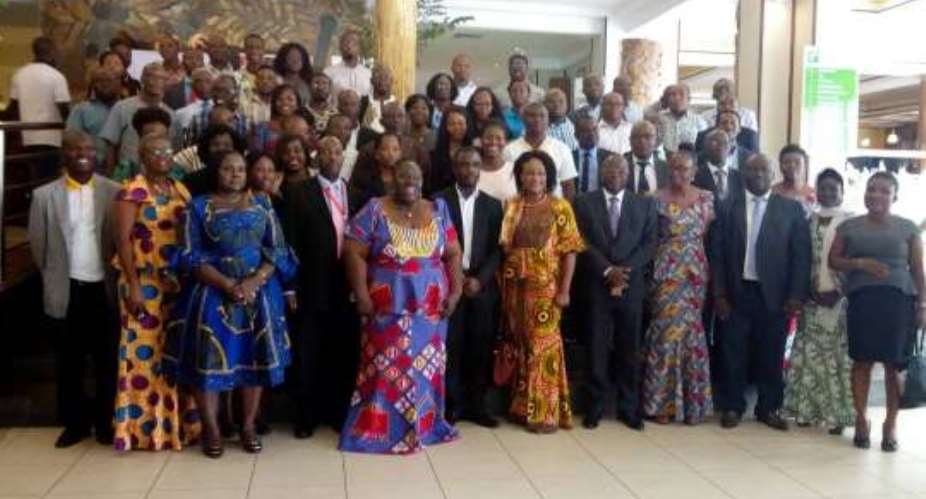Accra, July 18, GNA - A multi-stakeholder conference on financing social protection has been held with a call on faith-based organisations to play active role in advocating and working towards the improvement of social protection financing.
Ms Otiko Afisah Djaba, the Minister for Gender, Children and Social Protection, who made the call in Accra on Tuesday, said the issue of social protection financing was key to the sustainable development in the country.
'There is no need to deny the closeness between the strength of the social protection systems and the sustainable development attainment of the country,' she said.
Addressing representatives from the Parliament, Ministry of Finance, UNICEF, the media and other Civil Society Organisations at the conference on the theme: 'Financing Social Protection to Reduce Inequality', Ms Djaba observed that social protection was a vital component of every nation building and required all hands on deck to help position it well.
She said both child labour and human trafficking were also a major problem confronting the country, and there was the need to raise funds to conduct operations and provide shelter for the rescued children.
This she said would help serve as safe haven during reintegration processes.
'We as stakeholders and donor partners should walk the talk to ensure effective financing of social protection to reduce inequality.'
Ms Djaba explained that the protection of the rights of the vulnerable was a collective responsibility and that all stakeholders ought to play an effective role in ensuring that issues of inequality extensively.
'The Ministry of Gender, Children and Social Protection is engaging in flagship interventions, which are identified under the National Social Protection Policy including the National Health Insurance exemptions paving way for children, mental disorders and the elderly to be exempted from paying contributions.'
Mr Samuel Addei, the Clerk of the Committee on Poverty Reduction in Parliament said the conference, which brought stakeholders together to deliberate on practical ways of financing social protection towards the reduction of inequality in Ghana, was timely.
He said a recent research in Ghana had demonstrated that both poverty and inequality could be reduced by social protection programmes.
'This notwithstanding, there are substantial challenges given that social protection programme coverage is still limited, weak and under-resourced, with an average total spending of 0.61 per cent of Gross Domestic Product between 2009 and 2014,' he added.
'It is against this background that I find this gathering very timely and useful, especially as it gives the opportunity not only to strategically collate input into the development of the 2018 national budget influence allocations for social protection programmes but also to brainstorm on a way forward with regard to finding sustainable financing for social protection programmes in Ghana'.
He therefore called for strategic partnership and collaboration between the committee and various stakeholders engaged in social protection data generation, policy analysis as well as the development of ideas to accelerate inclusive national economic development.
He entreated members make input into the draft bill when it is sent to parliament to help create a robust financing system for social protection programmes,
Mr George Osei-Bimpeh, the Country Director of SEND-Ghana, organisers of the conference, said the country had achieved some successes in drafting development policies that promoted human progress, however, Ghana had since the 1990s seen the growth inequality getting out of control.
He said the highest level of inequality was registered in the Upper West region and it represented the largest increase.
Mr Osei-Bimpeh noted that lack of fund, irregular and unpredictable as well as inadequate disbursement of resources towards the implementation of social protection programmes was some of the inconsistencies that had made social protection to be hindered in the country.
He called for collaboration and coordination among key ministries, departments as wells as agencies related to social intervention programmes.
Mr Kwadwo Ansah, the Principal Economics Officer at the Ministry of Finance noted that poverty and income inequality appeared to be deeply rooted in the Northern region adding that 'Government spending on poverty reduction had increased significantly over the years,' he added.
GNA
By Elsie Appiah-Osei/ Julius K Satsi/ Janet Zeylisa Dauda, GNA





 Supreme court declares payment of wages to spouses of President, Vice President ...
Supreme court declares payment of wages to spouses of President, Vice President ...
 Publish full KPMG report on SML-GRA contract – Bright Simons to Akufo-Addo
Publish full KPMG report on SML-GRA contract – Bright Simons to Akufo-Addo
 Kumasi International Airport to begin full operations by end of June
Kumasi International Airport to begin full operations by end of June
 Election 2024: Our ‘real challenge’ is getting ‘un-bothered’ youth to vote – Abu...
Election 2024: Our ‘real challenge’ is getting ‘un-bothered’ youth to vote – Abu...
 [Full text] Findings and recommendations by KPMG on SML-GRA contract
[Full text] Findings and recommendations by KPMG on SML-GRA contract
 Renegotiate SML contract – Akufo-Addo to GRA, Finance Ministry
Renegotiate SML contract – Akufo-Addo to GRA, Finance Ministry
 J.B Danquah-Adu murder trial: Sexy Dondon to Subpoena Ken Agyapong, Ursula Owusu
J.B Danquah-Adu murder trial: Sexy Dondon to Subpoena Ken Agyapong, Ursula Owusu
 Galamsey: Five Burkinabes jailed 20 years each for mining
Galamsey: Five Burkinabes jailed 20 years each for mining
 'It's no crime' – Abu Sakara defends Alan's exit from NPP
'It's no crime' – Abu Sakara defends Alan's exit from NPP
 'We know all your houses, pay your bills now or we’ll disconnect you; we're all ...
'We know all your houses, pay your bills now or we’ll disconnect you; we're all ...
